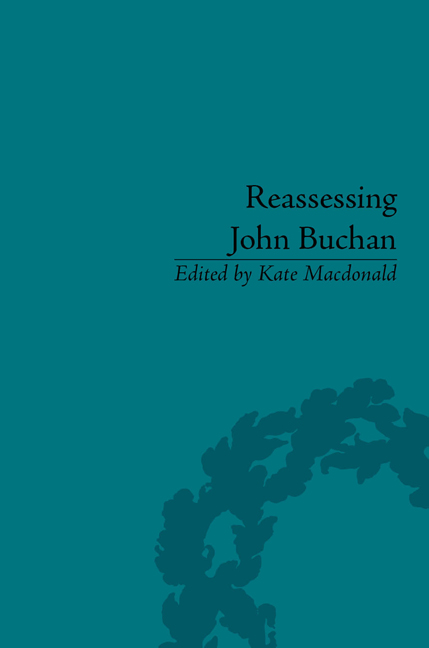Book contents
- Frontmatter
- CONTENTS
- List of contributors
- Introduction
- I Cultural Roots
- II Divided Loyalties
- 6 John Buchan and the South African War
- 7 John Buchan and the First World War: Fact into Fiction
- 8 Buchan and the Pacifists
- 9 John Buchan, America and the ‘British World’, 1904–40
- 10 Islam and the East in John Buchan's Novels
- 11 Conquistadors: Buchan's Businessmen
- III Literary Art
- Notes
- Works Cited
- Index
6 - John Buchan and the South African War
from II - Divided Loyalties
- Frontmatter
- CONTENTS
- List of contributors
- Introduction
- I Cultural Roots
- II Divided Loyalties
- 6 John Buchan and the South African War
- 7 John Buchan and the First World War: Fact into Fiction
- 8 Buchan and the Pacifists
- 9 John Buchan, America and the ‘British World’, 1904–40
- 10 Islam and the East in John Buchan's Novels
- 11 Conquistadors: Buchan's Businessmen
- III Literary Art
- Notes
- Works Cited
- Index
Summary
On 14 September 1901 John Buchan took ship from Southampton to South Africa. He had worked in his early twenties as a barrister of the Middle Temple, and in journalism as an editorial writer and book reviewer. Now he was embarking on something new. At Cape Town station where he took the train to the north, Buchan caught sight of military guards and the jostling crowds of refugees from the war which had engulfed southern Africa. He wrote to his younger brother, William: ‘I liked it, and felt I was at last getting near my work’. The train slowed to a crawl through the Northern Cape where there were rumours of Smuts's commando lying in wait up ahead. Crossing the Karoo Desert Buchan sat at the end of the train smoking his pipe and watching the passing landscape, his Scottish Presbyterian soul thrilling to its ‘sabbatical stillness’. At midday on Thursday 3 October the train crossed the Orange River into the Free State, newly under British administration as the Orange River Colony. He wrote to a friend ‘It was funny to see the watch-fires and the Kaffir scouts, to hear rifle shots and to see the guard turning out from every blockhouse with fixed bayonets till the train passed’. At the wayside stations, soldiers began to hitch a ride on the train, ‘so dusty and ragged that only their white teeth and clean nails distinguished them from tramps’. Near the border between the Orange River Colony and the Transvaal at Kroonstadt a young Lieutenant-Colonel came aboard: Douglas Haig whom Buchan had known at Oxford. They travelled on together discussing the progress of the war and the deeds of mutual friends under arms. On Friday evening Buchan arrived, in serious need of a bath, at his destination, Johannesburg. The following evening he dined with the man whose staff he had come to join, the High Commissioner of South Africa and governor of the occupied republics, Alfred Milner.
- Type
- Chapter
- Information
- Reassessing John BuchanBeyond the Thirty Nine Steps, pp. 65 - 76Publisher: Pickering & ChattoFirst published in: 2014



